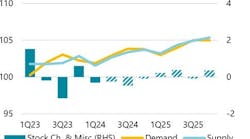Paula Dittrick
OGJ Senior Staff Writer
HOUSTON, Nov. 22 -- ExxonMobil Corp. believes unconventional sources of natural gas could represent 70% of US gas supplies by 2030, Steve Kirchhoff, ExxonMobil’s Americas vice-president for natural gas, told a recent Deloitte LLP oil and gas conference in Houston.
Kirchhoff cited ExxonMobil’s energy outlook during a panel discussion entitled “Oil Sands, Shale, and Conventionals in a Changing Global Marketplace” at the Nov. 18 Deloitte conference. Kevin O. Meyers, ConocoPhillips senior vice-president, exploration and production Americas, also was a panelist.
Meyers said more than 24 significant shale gas plays have been found in the US Lower 48 and Canada. “People are still looking,” Myers said. “Economics are probably what’s going to limit it.”
Separate from the panel discussion, a Deloitte survey of 201 oil and gas executives showed 58% of those polled expect decreased gas production based on proposed federal regulation of hydraulic fracturing. As a result of decreased production, 74% of those polled expect gas prices will rise.
There was no consensus on Henry Hub gas prices for 2011. Of those surveyed, 27% believed gas will peak at $5-6/MMcf. Meanwhile, 23% said gas prices will climb to $6-7/MMcf, 15% said $7-8/MMcf while 19% forecast gas prices below $5 MMcf.
Kirchhoff acknowledged the oil and gas industry needs to address negative publicity about hydraulic fracturing, which some critics suggest threatens groundwater. Some members of Congress suggest fracing should be regulated under the federal Safe Drinking Water Act. Currently, fracing is regulated by at the state level.
“I don't think we can overestimate the amount of communication we need to do here," Kirchhoff said, calling for government policies that encourage development of US gas reserves. Meyers also called for “supportive US government policy to capture gas opportunity.”
Branko Terzic, executive director of the Deloitte Center for Energy Solutions, agreed industry faces “misinformation” about fracing practices. He noted shale deposits are far below water tables.
“Industry will be able to demonstrate that it’s an issue that can be handled,” said Terzic, a former commissioner with the Federal Energy Regulatory Commission. He also chairs a United Nations ad hoc committee on clean energy and works as an international energy consultant.
Contact Paula Dittrick at [email protected].

